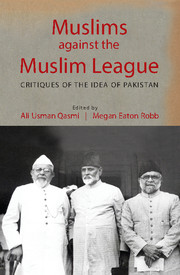Book contents
- Frontmatter
- Contents
- Acknowledgements
- Introduction
- 1 Maulana Husain Ahmad Madani and the Jami'at ‘Ulama-i- Hind: Against Pakistan, against the Muslim League
- 2 The Partition Conundrum: Perspectives, Experiences and Ambiguities from qasbahs in India
- 3 Choudhary Rahmat Ali and his Political Imagination: Pak Plan and the Continent of Dinia
- 4 Differentiating between Pakistan and Napak-istan: Maulana Abul Ala Maududi's Critique of the Muslim League and Muhammad Ali Jinnah
- 5 Advising the Army of Allah: Ashraf Ali Thanawi's Critique of the Muslim League
- 6 The Illusory Promise of Freedom: Mian Iftikhar-ud-Din and the Movement for Pakistan
- 7 Visionary of Another Politics: Inayatullah Khan ‘al-Mashriqi’ and Pakistan
- 8 Nonviolence, Pukhtunwali and Decolonization: Abdul Ghaffar Khan and the Khuda'i Khidmatgar Politics of Friendship
- 9 Islam, Communism and the Search for a Fiction
- 10 Muslim Nationalist or Nationalist Muslim? Allah Bakhsh Soomro and Muslim Politics in 1930s and 1940s Sindh
- 11 Dancing with the Enemy: Sikander Hayat Khan, Jinnah and the Vexed Question of ‘Pakistan’ in a Punjabi Unionist Context
- 12 Religion between Region and Nation: Rezaul Karim, Bengal, and Muslim Politics at the End of Empire
- 13 ‘The Pakistan that is going to be Sunnistan’: Indian Shi'a Responses to the Pakistan Movement
- 14 The Baluch Qaum of Kalat State: Challenging the Ideological and Territorial Boundaries of Pakistan
- Contributors
- Index
3 - Choudhary Rahmat Ali and his Political Imagination: Pak Plan and the Continent of Dinia
Published online by Cambridge University Press: 28 February 2018
- Frontmatter
- Contents
- Acknowledgements
- Introduction
- 1 Maulana Husain Ahmad Madani and the Jami'at ‘Ulama-i- Hind: Against Pakistan, against the Muslim League
- 2 The Partition Conundrum: Perspectives, Experiences and Ambiguities from qasbahs in India
- 3 Choudhary Rahmat Ali and his Political Imagination: Pak Plan and the Continent of Dinia
- 4 Differentiating between Pakistan and Napak-istan: Maulana Abul Ala Maududi's Critique of the Muslim League and Muhammad Ali Jinnah
- 5 Advising the Army of Allah: Ashraf Ali Thanawi's Critique of the Muslim League
- 6 The Illusory Promise of Freedom: Mian Iftikhar-ud-Din and the Movement for Pakistan
- 7 Visionary of Another Politics: Inayatullah Khan ‘al-Mashriqi’ and Pakistan
- 8 Nonviolence, Pukhtunwali and Decolonization: Abdul Ghaffar Khan and the Khuda'i Khidmatgar Politics of Friendship
- 9 Islam, Communism and the Search for a Fiction
- 10 Muslim Nationalist or Nationalist Muslim? Allah Bakhsh Soomro and Muslim Politics in 1930s and 1940s Sindh
- 11 Dancing with the Enemy: Sikander Hayat Khan, Jinnah and the Vexed Question of ‘Pakistan’ in a Punjabi Unionist Context
- 12 Religion between Region and Nation: Rezaul Karim, Bengal, and Muslim Politics at the End of Empire
- 13 ‘The Pakistan that is going to be Sunnistan’: Indian Shi'a Responses to the Pakistan Movement
- 14 The Baluch Qaum of Kalat State: Challenging the Ideological and Territorial Boundaries of Pakistan
- Contributors
- Index
Summary
Introduction
Rahmat Ali (1897-1951) is mentioned in the history textbooks circulating in Pakistan only briefly. His coining of the name for a separate Muslim polity, Pakistan, and the publication of the pamphlet Now or Never, which he wrote in 1933, are the reasons that Rahmat Ali found a marginal niche in the collective historical imagination of the Pakistani laity. In the Pakistan Studies books for undergraduate students, sponsored by the University Grants Commission, Rahmat Ali's description begins and ends in one line: ‘Choudhary Rahmat Ali had started his struggle for a separate state for Muslims in 1933.’ Why Rahmat Ali's other works, comprising ten pamphlets of varying size and scope, are not mentioned in Pakistani national discourse is a pertinent question that has not yet been framed. Similarly, his thoughts are conspicuously barred from circulation in the media as well as in educational institutions. Despite a sizeable corpus of literature in Urdu that underscores Rahmat Ali's role as a thinker and political visionary, including Khurshid Kamal Aziz's adulatory biography, Ali has remained a peripheral figure in the annals of Pakistani political history. The lack of interest in Rahmat Ali exhibited in the Pakistani national narrative could be due to his disdain for Muhammad Ali Jinnah, obvious in his writings. Rahmat Ali derisively branded Jinnah ‘Quisling-i-Azam,’ instead of Quaid-i-Azam (The Great Leader), his customary epithet in Pakistan. Similarly, his well-known repugnance for the idea of Pakistan as a nation state was explicitly articulated in a pamphlet The Greatest Betrayal, which he wrote after Pakistan's creation in 1947. This evolution in Rahmat Ali's political imagination will be the central focus of this chapter, in order to make sense of Rahmat Ali's virtual banishment from Pakistan's history, along with his thoughts and the history and evolution of the Pakistan National Movement that he founded in 1933. The Pakistan National Movement was later transformed to the All-Dinia Milli Movement in 1940. Thus Ali's political vision went through various phases of evolution: starting with the Pak Plan in 1933, it was transformed into the concept of the Continent of Dinia, and eventually culminated in the Cultural Orbit of Pakasia.
The sources employed for this study comprise the original writings of Choudhary Rahmat Ali, stocked as part of the Foster papers at the Centre of South Asian Studies, University of Cambridge.
- Type
- Chapter
- Information
- Muslims against the Muslim LeagueCritiques of the Idea of Pakistan, pp. 82 - 108Publisher: Cambridge University PressPrint publication year: 2017



